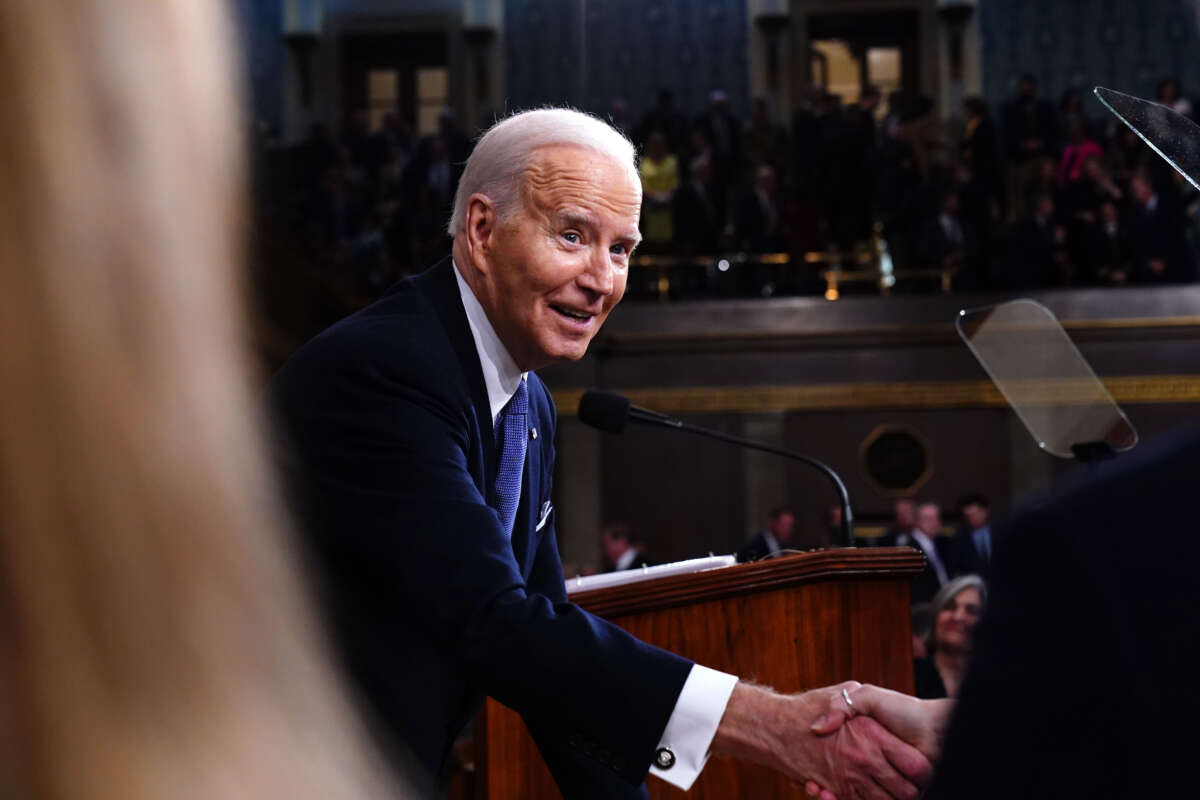Truthout is an indispensable resource for activists, movement leaders and workers everywhere. Please make this work possible with a quick donation.
Following President Joe Biden’s State of the Union address last week, Biden and Vice President Kamala Harris suggested that he might not engage in debates with former President Donald Trump in this year’s presidential rematch.
Following the speech, ABC News asked Harris whether Biden, the incumbent Democrat, was preparing to debate with Trump, who is now the presumptive Republican nominee following Nikki Haley’s departure from the primaries.
“We’ll get to that at some point and we’ll deal with that,” she said.
The Biden campaign has stated that whether the two will debate will be decided later in the election season.
Biden himself also hasn’t committed to debating. Speaking to reporters as he was leaving the White House for an event in Philadelphia, Biden said that a back-and-forth with Trump on a debate stage “depends on his behavior,” referring to Trump’s erratic tendency to interrupt and attack his political opponents.
Shortly after Haley’s departure from the race, Trump demanded that he and Biden take part in a debate, as they had during the 2020 election season.
“I am calling for Debates, ANYTIME, ANYWHERE, ANYPLACE!” Trump wrote on his Truth Social website, describing such debates as being “for the good of our country.”
Notably, Trump refused to debate any of his GOP challengers during the run-up to the primaries, even though polling demonstrated that a plurality of Americans wanted to see such a debate. Trump’s demand for debates comes despite his past animosity toward the Commission on Presidential Debates.
In 2022, likely responding to Trump’s dubious claims about the commission being biased, the Republican National Committee (RNC) announced that it was leaving the bipartisan civic group. “We are going to find newer, better debate platforms to ensure that future nominees are not forced to go through the biased CPD in order to make their case to the American people,” then-RNC chair Ronna McDaniel said at the time.
The first debate between Biden and Trump in the 2020 presidential campaign was mocked by critics, touted as the worst debate in modern presidential history, in large part due to Trump’s childish outbursts.
“As somebody who’s watched presidential debates for 40 years, as somebody who’s moderated presidential debates, as somebody who’s prepared candidates for presidential debates, as somebody who’s covered presidential debates, that was the worst presidential debate I have ever seen in my life,” said ABC News’s George Stephanopoulos following the first general election debate that year.
“The president of the United States … was by far responsible for a greater share of the jaggedness at a time when America does not need jagged,” CBS News’s John Dickerson said.
Debates have been found to have little importance in voters choosing who to support in the presidential contest, studies have shown. But Trump’s performance that year — and perhaps allowing a debate or two between him and Biden this year — could help to highlight one of his deepest flaws.
“Trump’s first debate performance was a minor disaster for his polling, but it was also a successful display of the authoritarianism that fires up his base,” said Danny Katch, a socialist and humorist who opined about the debate process for Truthout in 2020.
Katch added that the Commission on Presidential Debates needs to drastically change its format if it wants to become relevant for voters.
“It’s enraging to have to endure Trump’s flagrant violations of the rules both campaigns have agreed to, but the entire structure that produced those rules has for the past 30 years been designed to produce little more than softball questions for candidates to deliver sound bites and corny one-liners,” Katch noted.
A terrifying moment. We appeal for your support.
In the last weeks, we have witnessed an authoritarian assault on communities in Minnesota and across the nation.
The need for truthful, grassroots reporting is urgent at this cataclysmic historical moment. Yet, Trump-aligned billionaires and other allies have taken over many legacy media outlets — the culmination of a decades-long campaign to place control of the narrative into the hands of the political right.
We refuse to let Trump’s blatant propaganda machine go unchecked. Untethered to corporate ownership or advertisers, Truthout remains fearless in our reporting and our determination to use journalism as a tool for justice.
But we need your help just to fund our basic expenses. Over 80 percent of Truthout’s funding comes from small individual donations from our community of readers, and over a third of our total budget is supported by recurring monthly donors.
Truthout has launched a fundraiser, and we have a goal to add 231 new monthly donors in the next 48 hours. Whether you can make a small monthly donation or a larger one-time gift, Truthout only works with your support.
